- Home
- Bruce Sterling
Unstable Networks
Unstable Networks Read online
Unstable Networks
Bruce Sterling
Bruce Sterling
Unstable Networks
The commentary at cyberspace events often comes from a surprisingly wide area of the political and social spectrum, especially considering that most of the principals dress alike, look alike, and all use the same machinery. Still, the widely various people who speak at events like this have a bedrock of agreement. They will all declare that these are unprecedented and revolutionary times for computer communications, and that the decisions we make right now are going to drastically affect society for dozens, if not hundreds, of years to come.
And there's a lot of home truth in that assessment. We really have been involved in a revolutionary epoch - during the past seven years the status quo has taken a terrible battering, not just in the world of computation, but across the board, economically, politically, socially. There is a level of instability loose at the end of the 20th century that has not been around since at least 1945. Computer communications is one of most powerful, most influential, and least stable areas in the new world disorder.
However, it seems to me that finally, now, in the summer of 1996, we may have attained a comparative breathing-space. The flash-bulb of cyber-novelty has begun to fade from the retina of the public eye.
The bloom of apparently unlimited possibility has receded a bit. We've begun to get a grip on our dumbfounded wonder. This process may be disillusioning, but one needn't feel cynical about it. It's not a cause for despair. That's the lovely thing about unlimited possibility and its down-and-dirty interaction with the human condition.
There you are, you see - facing the marvelous unknown - all those possibilities. And, being human, you just have to make one little decision. Take one little action - just to show that you can, really. And there's a reaction to that action, and that's gratifying, so you take another step. Then another, and another, and another, and pretty soon you've got kids and a mortgage. You're committed. That's life.
We've managed to take some very important and very consequential actions in the past seven years. They may not have been wise actions, but we're not wise; we're just blundering about and doing the best we can. And what was the upshot? Basically, we've bet the farm on the digital imperative.
In the year 1996, everything aspires to the condition of software. Art, politics, music, money, words-in-a-row, even sex wants to be digital and on a network. Everything aspires to the nebulous and liquid quality of moving digital information. We're getting used to this prospect in 1996. We can spare ourselves the exhilarating sense of hysteria that this new reality provokes. We should seize this chance to get a little mental oxygen. We'll need it.
The year 1996 is nicely poised between the world-shattering events of 1989 and the onrushing specter of the year 2000. The planet is still visibly recovering from 1989, the year the cold war ended, and maybe the first year in which computer networks came creeping out of technical obscurity to seriously menace the status quo. Unless I miss my guess, the year 2000 will also be a truly extraordinary historical moment. The year 2000 will be an excellent opportunity to deny and dispose of the deeply repugnant twentieth century. In the year 2000 there will be a general erasing of the memory banks, a bitter scorn for the hopelessly outdated, a firm and somewhat frantic rejection of a great deal of cultural baggage. Like most New Year's Parties, it'll feel so good that none of us will be able to resist. In the year 2000, we'll all be engaged in a general frenzy of bright-eyed denial.
So there's not much point in raising the black flag and rushing the barricades in 1996. That's always a natural temptation, but we might be better advised to gather our wits and save some strength. Anything that we decide is electronic gospel right now will simply be kicked out of court in 2001. So even though we are all computer enthusiasts here, just for once let's try not to get completely worked up. There's sure to be plenty of time and reason for panic later.
Because now, in 1996, we really have an Information Society. We used to talk about having an information society, and dream ardently of living in one, and now we've actually got one. In 1989 it was still theory and vaporware, but this is 1996, and we're in bed with it. We have to watch it eat crackers, we have to launder its sheets.
Now that we've got it, what can we say about it? The very first fact to bear in mind about our Information Society is that this too shall pass.
We live in the Information Age now, but there are people walking around in this city who have lived through the Aviation Age, the Radio Age, the Thousand-Year Reich, the Atomic Age, the Space Age, the New Age, the Aquarian Age, not to mention the sexual revolution and the epoch of New Soviet Man. And trust me, a lot of these geezers and geezerettes are going to outlive the Information Age as well. In the old days history used to leave people behind, but now the pace of innovation is so savage that individual human beings can leave history behind. This "age" stuff comes pretty cheap to us nowadays. We postmodern types can burn out an age in ten years.
There's nothing more grotesquely temporary than a computer. I, personally, have two perfectly functional Apples and an Atari in a storeroom. I have no idea what to do with these computers. They cost me a great deal of money. Learning to use them was very complex and tiresome. It seemed like a very hip and groovy idea at the time, but now those high-tech gizmos are utterly obsolete and worthless. If I leave them on the sidewalk outside my house, together with the software and the manuals, nobody will bother to bend over and pick them up.
I moved house recently. This caused me to make a trip to the Austin city landfill. Austin has a very nice landfill actually, it's manned by well-meaning Green enthusiasts who are working hard to recycle anything usable. When I went there last month I discovered a heap of junked computers that was two stories high. Dead monitors, dead keyboards, dead CPUs, dead modems. The junk people in my home town get a stack that size once a week.
I had to pay some close attention to that mighty heap of dead computers. It had all the sinister lure of the elephants' graveyard. Most of those computers looked like they were in perfect working order. The really ominous part of the stack was the really quite large percentage of discarded junk that was still in the shrinkwrap. Never been used, and already extinct.
Sometimes I talk to audiences who aren't computer enthusiasts like you, people who are deeply and genuinely intimidated by computers. I urge them not to worry too much. I urge them to think of a computer as something like a dragonfly. Yes, a dragonfly can do many impressive things that no human being can do, such as hover in midair and eat gnats. And yes, a dragonfly might even bite you. But you see, a dragonfly is a very temporary thing. In the height of summer, there will be whole clouds of them up there, sunlight glinting off their diaphanous wings, just flitting by, eating those gnats.
But then the winter will come. And the snow will pile high. And every one of those lovely dragonflies will be cold, and stiff, and dead. But you - you'll be cozied up in your bathrobe and bunny slippers, sipping hot chocolate and reading Danielle Steel novels.
Gordon Moore says that a computer generation lasts about eighteen months. He says that computer chips double in power every eighteen months, roughly speaking. That means that a computer in 2010 is about 150 times as powerful as a computer in 1990. Roughly speaking. I had a computer in 1990. With any kind of luck I'll probably be around in 2010, and I rather imagine I'll have a computer then, too. So exactly how impressed am I supposed to get about a 1996 computer? It's maybe five percent of the computer I'll eventually be using. That's like comparing a matchbox car to a Rolls Royce.
Even paperback books have a far longer lifespan than computers. It's a humble thing, a book, but the interface doesn't change and they don't need software upgrades and new oper
ating systems. A five dollar paperback book will dance on the grave of a five thousand dollar computer.
Nothing that is real is absolute. In anything real there is good news and there's bad news. The Information Society has become a reality. There's good news, ladies and gentlemen, and there's bad news. The good news is, the digital revolution is over. The digits won hands down. Casualties were low, considering. We now live in the early days of the digital provisional government.
The bad news is that the provisional government is inherently unstable. Its powerbase is a giant virtual castle made of bits. Bits of sand.
It's a very mixed bag, the information age. Don't get me wrong; I love living here. Like a lot of my generation, I grew up more or less expecting nuclear armageddon, and with that prospect off the front burner, life for me is a carnival. In the Information Age, every day's an adventure. I'm never bored.
The Information Age has many stellar virtues. It is market driven and extremely innovative. It's high-tech, hip and fast on its feet. People who work in this field are deeply opportunistic and will seize on the slightest chance at daylight.
The bad news is, if you survive every day by agile broken-field running it's easy to lose sight of your goals. In fact, you can forget the very concept of goals; you can run incredibly hard every day just to remain in the same place.
The Information Society has basically forfeited any democratic control over its own destiny. No one's opinion is ever asked, nobody is ever polled. If we'd been asked to vote in a digital revolution, it almost certainly would never have happened. We were never offered that chance, it never occurred to us to ask for it or take it. Our lives have been turned upside down by a series of obscure technical events that transpired in a nearly perfect political vacuum. The moral idea of informed consent was never raised. Weird homemade machinery that was full of bugs and never worked very well burst out of garages in California and destroyed the modern capitalist order. That's the story, basically. Like it or lump it.
There are vast fortunes to be made overnight in the Information Society. It's the hottest economic game on the planet. Vast fortunes can be lost just as quickly. Worse yet, there's no good safe place to store your loot if you make a pile and decide to jump off the jampacked no-brakes information bus. Thanks to computers, the stock market and bond market and currency markets are aswarm with sophisticated capital instruments that have created a seething global casino economy. There's more money in the thrash of leverage, futures and derivatives than there is in rational capitalist investment. In an Information Society, even oil companies want to act like Hollywood.
Thanks to modems, cellphones, cell-faxes, laptops, beepers and satellite dishes, we're never out of touch. I can read my email (which I happen to store in San Francisco) whenever I'm in Vancouver. The bad news is that, yes, I can read my email in Vancouver. I could be doing great British Columbia-type things instead: having the BC sushi roll, shopping in Chinatown, spiking the old growth forest. But I'll deny myself those harmless, life-enhancing amusements, because I feel compelled to mind my business and read my email.
There might be some kind of urgent message from a publisher in Italy. I've had publishers in Italy for years now, but they never, ever sent me urgent messages, because they used to know full well that it was useless. Now they can reach me fast and cheap and by golly, they expect to reach me and they expect a response. Can't neglect that email. It's got global reach! I might get fanmail from some cypherpunk in Finland. Some teenage hacker in Abu Dhabi wants me to tell him how to break into Saudi mainframes, so he can get his hands chopped off by the authorities. I'm never out of touch. I'm never allowed to be, because there's no place left to hide.
When I'm not changing diapers, I fancy myself quite the hip globetrotter Information Age kind of guy. That's because I have friends in Prague. People in Prague are very friendly, they have a lovely town and a unique culture. They're also very hospitable, and it's a good thing, because since 1990 or so they've been getting about 80 million people a year through that city.
This influence of rampant globalization is hitting a little country which was deepfrozen behind the Iron Curtain for forty years. The Web throws down its virtual threading all over the world, and what does this do to indigenous cultures? I don't think there's a lot of use in mincing words here. I think it's pretty clear that the Information Society engulfs and devours the little unique places.
It's wonderful to visit Prague, but if you're a citizen of the Information Society, you can't touch that place without denting it. Every quiet and hidden place in the world bears our fingerprints now. As the seasoned travel writer Pico Iyer likes to put it, it's Video Night in Katmandu.
For me this situation is great. Basically, I live and breathe and thrive through cultural imperialism. I have four books out in Denmark this year. You see, I got interviewed by some stranger over the Internet, and it turned out he worked for a major newspaper in Copenhagen. Suddenly and quite without my own intention, I became rather well-known in Denmark. This October I'm flying to Copenhagen to do my one-man corporate multinational thing.
I'll be an American science fiction writer living it up in Denmark. How many Danish science fiction writers do I know? Zero. I know they must exist, so I hope I'll meet some. For me to get published in their country - it's easy, it's something I can do by accident. For a Danish science fiction writer to get published in my country - they'd have better luck trying to ooze face-first through a one-way mirror.
Is the Internet really a many-to-many, egalitarian network? Is a guy with a modem in Copenhagen or Montreal really on the same level as a guy with a modem in Austin or San Francisco? I'd like to think that is the case. Although it clearly isn't.
Personally, I like to talk to remote strangers on the Internet. I always go out of my way to reply politely to these odd characters around the planet with their unlikely Internet addresses and their entertainingly broken English - English which, by the way, is always a million times better than my French, my Russian, my Czech, my Danish, or my Japanese.
The good news is that I can chat with distant strangers. The bad news is that while I'm on the Internet, I'm not chatting to my next door neighbor. I'm not going to any neighborhood rallies, I'm not throwing parties for local friends, I'm not babysitting other people's kids. It may be that I'm not even talking to my own children, who are off in the living room being raised by Nintendo. Sure, I can trade digital video clips with hackers in Borneo over World Wide Web, but for all I know my next-door neighbor is a serial killer with an icebox full of his acquaintances.
Is this a pernicious aspect of the Information Society? Well, how will we know? Who can tell? Who's keeping track? Suppose it were pernicious - how would they stop me? Are the police supposed to unplug and confiscate my modem, tell me to go to the local Rotary Club and stop typing messages to people in Djakarta and Vladivostok? By what right?
There's always something new in cyberspace circles. It's unfailingly entertaining, you've got to give it that. There's a scandal a week, sometimes two. I wrote a nonfiction true-crime book about one of these cyberspace scandals once - it took me a year and a half to do it. I could write a similar book once every week if there were fifty-two of me.
Let's just dip our fingertips into this brimming cornucopia of digital bounty, shall we? Government abuse of confidential files. Software piracy on pirate bulletin boards. Canadian judicial gag rules on cases flouted by people on the Internet. The CIA, the NSA trolling the Internet for anything they might find useful. The French secret service bribing and supplying money to the Chaos Computer Club. Cryptography scandals, just no end to those; crypto has more scandals and screw-ups and bonehead moves than a 24 hour festival of the Three Stooges.
Oceans of money sloshing around. Telephone companies buying cable companies, software companies buying cellphone companies, computer companies buying parts of the radio spectrum. Internet startups offering voice phone software, telephone companies offering Internet hookups. Software pa
tents, algorithm patents. Computer search and seizure practice. Spamming scandals, virus scandals. Poisoned JAVA applets - bad applets - rotten applets.
I've watched this stuff going on for years now. A pattern is emerging. It's amazing how little is ever decided, how little there is to show at the end of the day. Everything is temporary, all band-aids and toothpicks. Every once in a while there's a solemn edict from on high, something like America's Communications Decency Act, a ridiculous gesture with absolutely no connection to reality. Quite often some small and innocent person is inconvenienced, insulted or even crushed by the blind mechanisms of the powers-that-be, but that changes nothing. Events that might become case law or policy are treated merely as traffic accidents on the Internet. "What, they arrested him? Too bad! What, they might arrest me too? Ha ha ha! Forget it!"
People who like computers are really smart. They're bright, imaginative and inventive people. They also work hard, they are quick studies and they tend to have quite a lot of money and to deploy it with gusto and relish. Despite these manifest virtues, these bright, inventive computer people are some of the worst organizers in the world. They can't organize a bridge party without wanting to change the cards half-way for a colorful graphic-intensive Tarot deck. Everybody wants to be the symbolic analyst, nobody wants to empty the ashtrays and make the hors d'oeuvres. They're hungry all right, but they don't want to fill the sink, roll up sleeves and do the dishes. Too slow, too dirty, too analog. Can't we just order Chinese take-out and have it faxed in?
Instability is the congenital disorder of the lords of the Information Society. It's their version of the mark of Cain. Even the pathetic brainwashed victims of corrupt Christian televangelists can out-organize computer people. They don't want to build their own system, fill the potholes and root out the sewers. They want to hack the old system overnight and scamper off with unearned rewards. That's why Ross Perot, a textbook case of a megalomaniacal computer tycoon, thinks he can make himself President by skipping any actual political career and making gestures on a TV talk show.

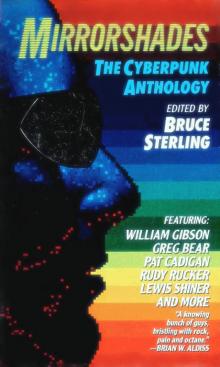 Mirrorshades: The Cyberpunk Anthology
Mirrorshades: The Cyberpunk Anthology The Wonderful Power of Storytelling
The Wonderful Power of Storytelling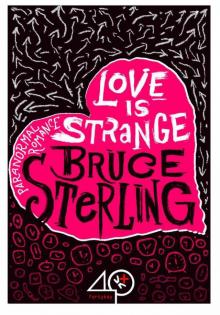 Love Is Strange (A Paranormal Romance)
Love Is Strange (A Paranormal Romance)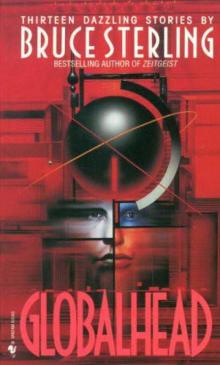 Globalhead
Globalhead Essays. FSF Columns
Essays. FSF Columns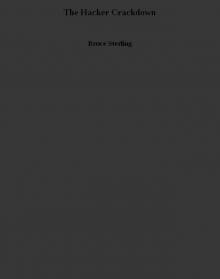 The Hacker Crackdown
The Hacker Crackdown Bicycle Repairman
Bicycle Repairman Black Swan
Black Swan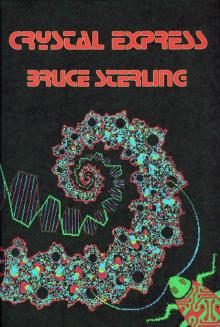 Crystal Express
Crystal Express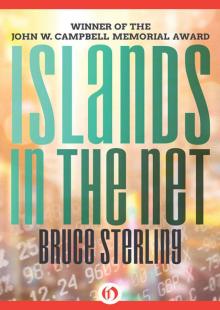 Islands in the Net
Islands in the Net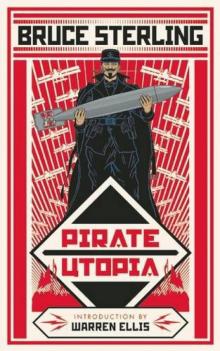 Pirate Utopia
Pirate Utopia GURPS' LABOUR LOST
GURPS' LABOUR LOST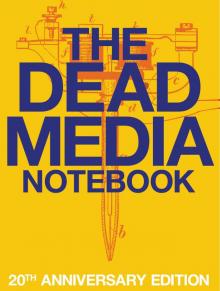 The Dead Media Notebook
The Dead Media Notebook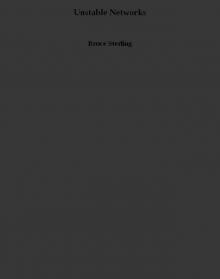 Unstable Networks
Unstable Networks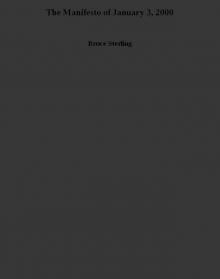 The Manifesto of January 3, 2000
The Manifesto of January 3, 2000 Heavy Weather
Heavy Weather Involution Ocean
Involution Ocean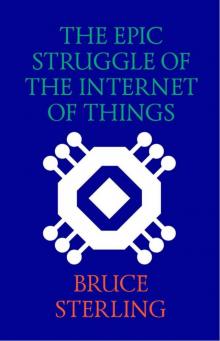 The Epic Struggle of the Internet of Things
The Epic Struggle of the Internet of Things A Good Old-Fashioned Future
A Good Old-Fashioned Future The Littlest Jackal
The Littlest Jackal Zeitgeist
Zeitgeist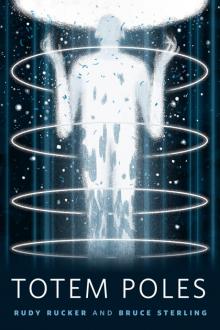 Totem Poles
Totem Poles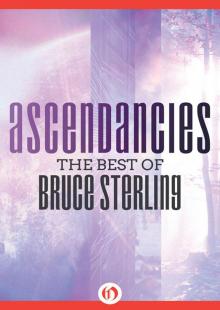 Ascendancies
Ascendancies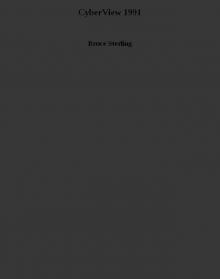 CyberView 1991
CyberView 1991 War Is Virtual Hell
War Is Virtual Hell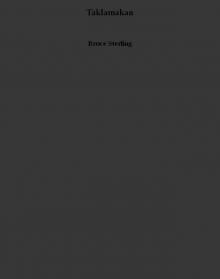 Taklamakan
Taklamakan Holy Fire
Holy Fire Cyberpunk in the Nineties
Cyberpunk in the Nineties Schismatrix Plus
Schismatrix Plus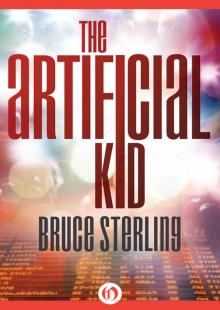 The Artificial Kid
The Artificial Kid Essays. Catscan Columns
Essays. Catscan Columns Maneki Neko
Maneki Neko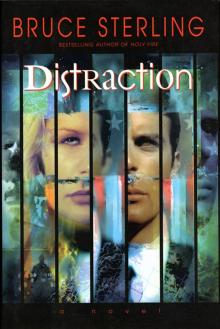 Distraction
Distraction In Paradise
In Paradise Red Star, Winter Orbit
Red Star, Winter Orbit Luciferase
Luciferase